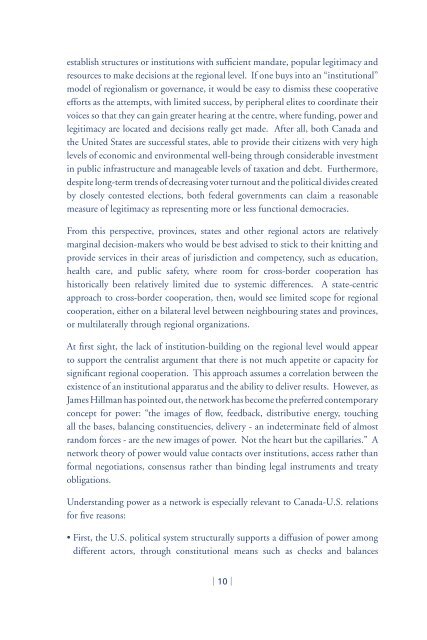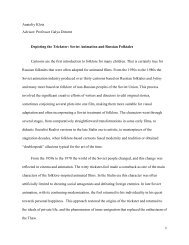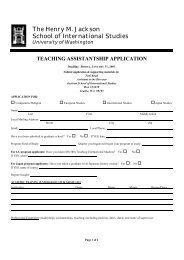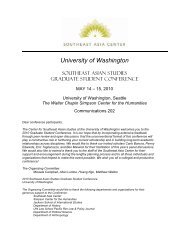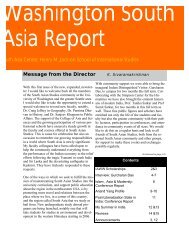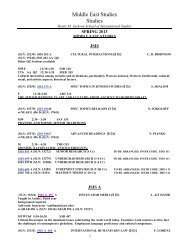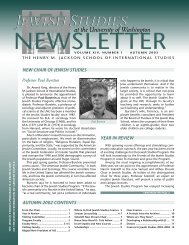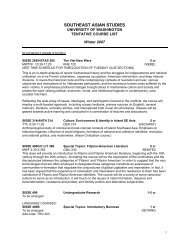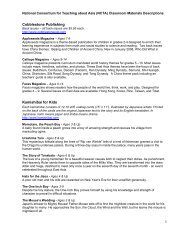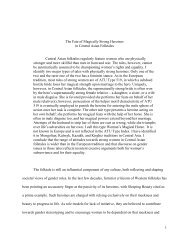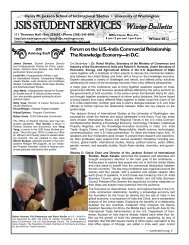Beyond Borders: Regional Partnerships in the Pacific Northwest
Beyond Borders: Regional Partnerships in the Pacific Northwest
Beyond Borders: Regional Partnerships in the Pacific Northwest
You also want an ePaper? Increase the reach of your titles
YUMPU automatically turns print PDFs into web optimized ePapers that Google loves.
establish structures or <strong>in</strong>stitutions with sufficient mandate, popular legitimacy and<br />
resources to make decisions at <strong>the</strong> regional level. If one buys <strong>in</strong>to an “<strong>in</strong>stitutional”<br />
model of regionalism or governance, it would be easy to dismiss <strong>the</strong>se cooperative<br />
efforts as <strong>the</strong> attempts, with limited success, by peripheral elites to coord<strong>in</strong>ate <strong>the</strong>ir<br />
voices so that <strong>the</strong>y can ga<strong>in</strong> greater hear<strong>in</strong>g at <strong>the</strong> centre, where fund<strong>in</strong>g, power and<br />
legitimacy are located and decisions really get made. After all, both Canada and<br />
<strong>the</strong> United States are successful states, able to provide <strong>the</strong>ir citizens with very high<br />
levels of economic and environmental well-be<strong>in</strong>g through considerable <strong>in</strong>vestment<br />
<strong>in</strong> public <strong>in</strong>frastructure and manageable levels of taxation and debt. Fur<strong>the</strong>rmore,<br />
despite long-term trends of decreas<strong>in</strong>g voter turnout and <strong>the</strong> political divides created<br />
by closely contested elections, both federal governments can claim a reasonable<br />
measure of legitimacy as represent<strong>in</strong>g more or less functional democracies.<br />
From this perspective, prov<strong>in</strong>ces, states and o<strong>the</strong>r regional actors are relatively<br />
marg<strong>in</strong>al decision-makers who would be best advised to stick to <strong>the</strong>ir knitt<strong>in</strong>g and<br />
provide services <strong>in</strong> <strong>the</strong>ir areas of jurisdiction and competency, such as education,<br />
health care, and public safety, where room for cross-border cooperation has<br />
historically been relatively limited due to systemic differences. A state-centric<br />
approach to cross-border cooperation, <strong>the</strong>n, would see limited scope for regional<br />
cooperation, ei<strong>the</strong>r on a bilateral level between neighbour<strong>in</strong>g states and prov<strong>in</strong>ces,<br />
or multilaterally through regional organizations.<br />
At first sight, <strong>the</strong> lack of <strong>in</strong>stitution-build<strong>in</strong>g on <strong>the</strong> regional level would appear<br />
to support <strong>the</strong> centralist argument that <strong>the</strong>re is not much appetite or capacity for<br />
significant regional cooperation. This approach assumes a correlation between <strong>the</strong><br />
existence of an <strong>in</strong>stitutional apparatus and <strong>the</strong> ability to deliver results. However, as<br />
James Hillman has po<strong>in</strong>ted out, <strong>the</strong> network has become <strong>the</strong> preferred contemporary<br />
concept for power: “<strong>the</strong> images of flow, feedback, distributive energy, touch<strong>in</strong>g<br />
all <strong>the</strong> bases, balanc<strong>in</strong>g constituencies, delivery - an <strong>in</strong>determ<strong>in</strong>ate field of almost<br />
random forces - are <strong>the</strong> new images of power. Not <strong>the</strong> heart but <strong>the</strong> capillaries.” A<br />
network <strong>the</strong>ory of power would value contacts over <strong>in</strong>stitutions, access ra<strong>the</strong>r than<br />
formal negotiations, consensus ra<strong>the</strong>r than b<strong>in</strong>d<strong>in</strong>g legal <strong>in</strong>struments and treaty<br />
obligations.<br />
Understand<strong>in</strong>g power as a network is especially relevant to Canada-U.S. relations<br />
for five reasons:<br />
• First, <strong>the</strong> U.S. political system structurally supports a diffusion of power among<br />
different actors, through constitutional means such as checks and balances<br />
| 10 |


